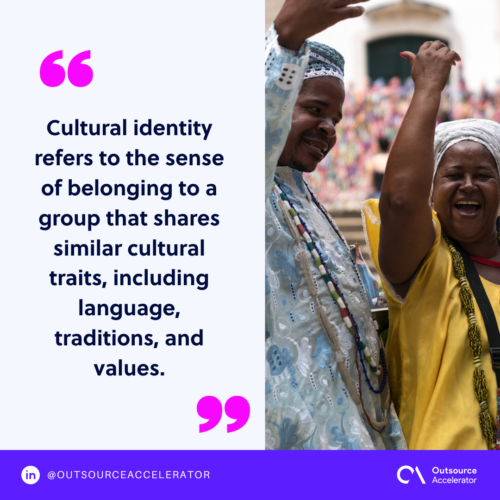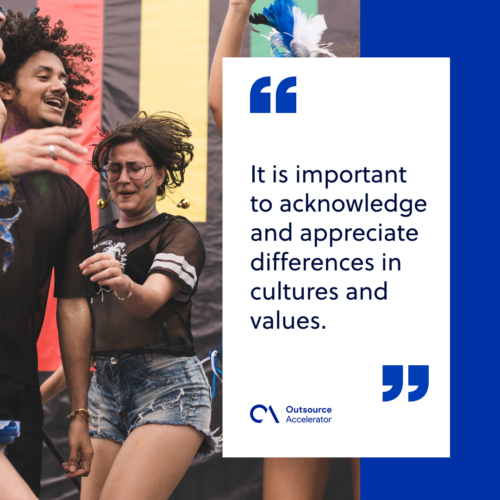Maintaining cultural identity in the age of global employment

With the rise of outsourcing, offshore staffing, and remote work, today’s workforce is now more global than ever.
As companies increasingly adopt global employment strategies, employees of different nations find it crucial to maintain their own cultural identity.
In this article, we will define cultural identity, discuss how the increasingly global workforce impacts it, and provide strategies for maintaining cultural identity in the age of globalization.
Defining cultural identity
Cultural identity refers to the sense of belonging to a group that shares similar cultural traits, including language, traditions, and values.
These factors can influence how employees perceive themselves and how they interact with other team members. One’s upbringing and experiences shape cultural identity, but it is dynamic and can evolve over time.
It is safe to say that employees in the same nation will have similar cultural identities. But in the world of globalized employment, how can employees maintain their cultural identity while still adapting to other cultures?
In the 498th episode of the Outsource Accelerator Podcast, BSA Solutions CEO Zana Gawan-Taylor noted that “diversity should be a two-way street,” adding that her company emphasizes “two-way communication and two-way learnings.”
“It [means] Filipinos learning and understanding the Australian culture and also Australian to understand the Philippine culture,” Zana added.

The impact of global employment on cultural identity
Global employment is generally defined by the movement of jobs across borders and the collaboration of diverse teams worldwide. Naturally, it has significant implications for cultural identity.
It fosters cultural exchange, enriching the workplace with a diversity of perspectives and practices. Employees gain exposure to different cultures, broadening their horizons and promoting mutual understanding.
However, global employment also poses challenges. A major concern is the risk of cultural homogenization, where unique cultural identities blend into a more uniform global culture.
The pressure to conform to global business norms may diminish the expression of individual cultural identities, causing a disconnect from one’s heritage.
5 Strategies to maintain cultural identity for outsourcing firms
Outsourcing firms like BSA Solutions manage diverse and cross-border teams. It is crucial for trusted service providers to implement strategies to maintain cultural identity.
To get started, here are some strategies that outsourcing firms can implement:
1. Encourage cultural awareness and sensitivity
Implementing cultural sensitivity training programs helps employees understand and respect cultural differences. These programs can cover topics such as communication styles, social norms, and etiquette specific to different cultures.
Even leaders can benefit from awareness training, like in Zana’s case.
“I’m working with Kaizen Leadership Asia in terms of getting foreigners or businesses who do business with Filipinos to have an open perspective, of open view of the different cultures and, making it a two-way learning rather than, “You have to adapt my way.””
2. Create inclusive work environments
Implement policies that support cultural diversity and inclusion. This includes anti-discrimination policies, flexible work arrangements to accommodate cultural practices, and diversity training for all employees.
Further, leadership plays a crucial role in fostering a culturally inclusive environment. Leaders should model inclusive behavior, support diversity initiatives, and create a culture of respect and appreciation for all cultural identities.
3. Appreciate differences
It is important to acknowledge and appreciate differences in cultures and values.
In the podcast, Zana stated, “It’s not right to say that Australian culture is better than the Philippines culture, because I think there are many aspects of Philippine culture that is admirable…
[Like] how they survive, how they can do more with less, how the community works, the generosity and the humility. There are a lot of aspects in Philippine culture that, for me, is, “Why should you take it off them? We should be actually exemplifying from them.”

4. Engage in Corporate Social Responsibility (CSR) efforts
Engaging with local communities through CSR initiatives can help support cultural preservation. Outsourcing firms can participate in community projects that promote and preserve local culture.
Outsource Accelerator awards the top CSR efforts from global BPO companies yearly. Check out the winners of the Outsourcing Impact Awards (OIR) 2023 here.
OIR categories include:
- Diversity, equity, and inclusion
- Community building
- Health and wellness
- Education
This is only proof that more and more BPO firms are engaging in CSR efforts for their employees and communities.
5. Celebrate cultural diversity
Hosting events that celebrate various cultural holidays and traditions fosters an inclusive environment. Encourage employees to share their cultural practices to promote mutual respect and appreciation.
As global employment continues to grow, maintaining cultural identity becomes increasingly important.
By valuing and respecting cultural diversity, these firms not only enhance employee satisfaction and retention but also contribute to a richer, more vibrant global workforce.







 Independent
Independent




